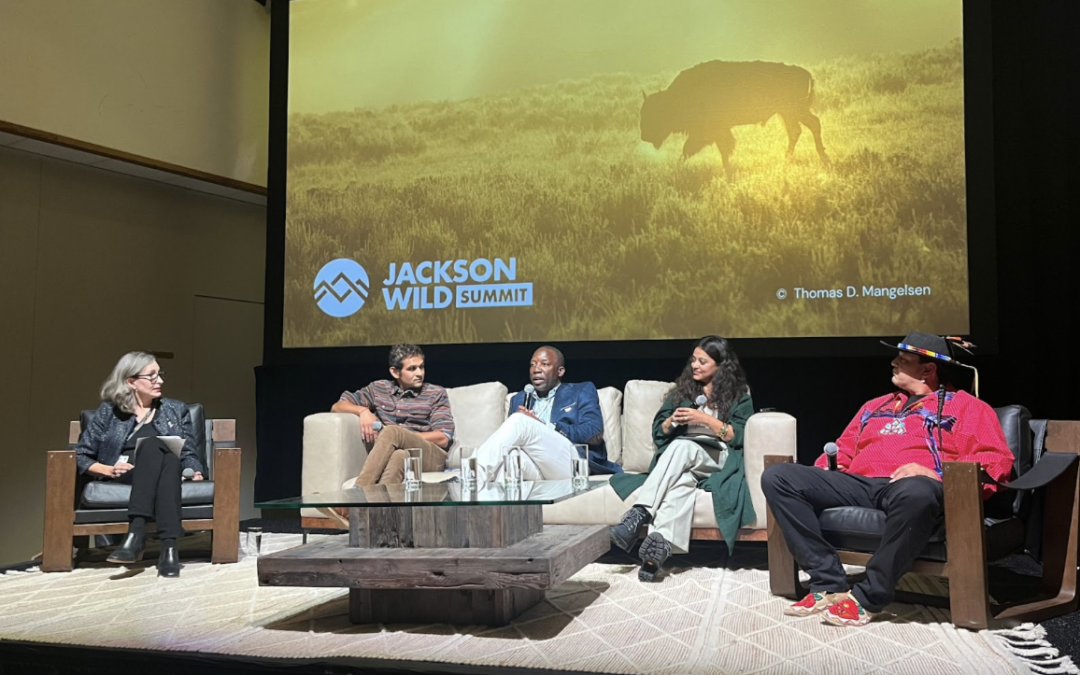Last week, I was honored to produce and moderate a panel at the Jackson Wild Film Festival and Conservation Summit: Coexistence – More than an Aspiration: Stories and Lessons of Community Ancestral, Cultural, and Spiritual Ties to Wildlife. This was my 7th Jackson Wild Summit (6 in Jackson, Wyoming, and one in Austria), and it was fantastic to see old friends and colleagues and make new ones! There is no more inspiring place than the Grand Tetons to discuss wildlife conservation and filmmaking.
Our panel featured Gunjan Menon (Beyond Premieres), Jason Baldes (Wind River Tribal Buffalo Initiative), Jimmiel Mandima (International Fund for Animal Welfare), and Roshan Patel (Smithsonian’s National Zoo and Conservation Biology Institute).
I introduced the topic with a brief overview of OneNature’s work on the missing pieces in conservation – understanding and tracking the wellbeing of the communities in which we work (from their perspective!) and understanding and supporting the existing cultural, spiritual, and ancestral connection to wildlife that can underpin our conservation work.
Roshan introduced the story in his film “Pride” about how rural communities in India started working with the government to create a protected habitat for the highly endangered Asiatic lions and how the presence of lions benefits farmers, keeping herbivores away from crops growing in their fields. Jimmiel shared what it was like growing up with stories of totem animals, taboos, and beliefs linked to nature and the environment in his village in Zimbabwe and the role these stories and connections played in his community. Gunjan (whose film “Wings of Hope” was later awarded the Audience Choice Award for the World Wildlife Day showcase) shared examples from her work of how religion can be a powerful conservation tool when beliefs favor wild animals. Jason shared a powerful story of how 19 tribes united to create the Intertribal Bufalo Council to restore buffalo to Tribal lands for cultural and spiritual enhancement and preservation. His explanation of the medicine wheel and the buffalo’s role in these communities touched us all.
We had an excellent and wide-ranging conversation during the panel that included our view on diverse worldviews and how we, as conservationists, filmmakers, or even as individuals, can begin to notice the dominant narrative and the alternative options available to us: The need to keep these critical connections and stories alive and how communities achieve this through building capacity for storytelling and conservation and making sure communities have access to the films and other products of the work; the role that spiritual connections to wildlife can have in mitigating conflict with sacred species in the face of rising pressures; and how seeing other, non-human animals as equals can increase tolerance and can create an entirely different approach to conflict and the role that conservation and film can have in supporting, reviving, and even restoring these practices.
Finally, we shared our thoughts on how current conservation and science approaches can fit into an overarching worldview of connection and how different approaches can coexist and support each other.
I hope the audience enjoyed it as much as I did! I feel enriched and inspired by the speakers’ experience and wisdom. We even had a few offers to take the panel on the road (and virtually).
Thank you to Jackson Wild and all the fantastic speakers!
